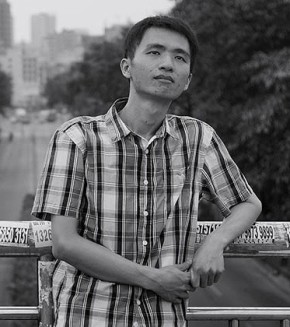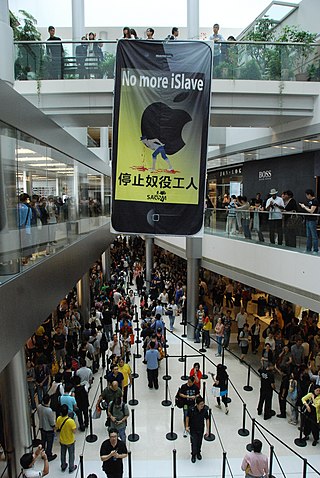
Apple Inc. is an American multinational corporation and technology company headquartered in Cupertino, California, in Silicon Valley. It designs, develops, and sells consumer electronics, computer software, and online services. Devices include the iPhone, iPad, Mac, Apple Watch, Vision Pro, and Apple TV; operating systems include iOS, iPadOS, and macOS; and software applications and services include iTunes, iCloud, Apple Music, and Apple TV+.

A sweatshop or sweat factory is a crowded workplace with very poor or illegal working conditions. The manual workers are poorly paid, work long hours, and experience poor working conditions. Some illegal working conditions include poor ventilation, little to no breaks, inadequate work space, insufficient lighting, or uncomfortably/dangerously high or low temperatures. The work may be difficult, tiresome, dangerous, climatically challenging, or underpaid. Workers in sweatshops may work long hours with unfair wages, regardless of laws mandating overtime pay or a minimum wage; child labor laws may also be violated. Women make up 85 to 90% of sweatshop workers and may be forced by employers to take birth control and routine pregnancy tests to avoid supporting maternity leave or providing health benefits.
A contract manufacturer (CM) is a manufacturer that contracts with a firm for components or products. It is a form of outsourcing. A contract manufacturer performing packaging operations is called copacker or a contract packager. Brand name companies focus on product innovation, design and sales, while the manufacturing takes place in independent factories.
Hon Hai Precision Industry Co. Ltd., trading as Hon Hai Technology Group in China and Taiwan and Foxconn internationally, is a Taiwanese multinational electronics contract manufacturer established in 1974 with headquarters in Tucheng District, New Taipei City, Taiwan. In 2021, the company's annual revenue reached 6.83 trillion New Taiwan dollars and was ranked 20th in the 2023 Fortune Global 500. It is the world's largest contract manufacturer of electronics. While headquartered in Taiwan, the company earns the majority of its revenue from assets in China and is one of the largest employers worldwide. Terry Gou is the company founder and former chairman.

The Fair Labor Association (FLA) is a non-profit collaborative effort of universities, civil society organizations, and businesses.
China Labor Watch (CLW) is a U.S. based non-profit organization founded by labor activist Li Qiang in 2000. It works with governments, nonprofits, businesses and other groups to highlight and put a end to labor abuses involving Chinese workers. It produces investigative reports, classes for Chinese workers, and a hotline for these workers.

Sweatshop-free or sweat free is a term first used by American Apparel, a famous American clothing brand, which means coercion-free, fair-compensation for the garment workers who manufacture their products. The aim of sweatshop-free wish to ensure that all employees are treated fairly and products are made in good working conditions. Sweatshop-free standards include the right to collective bargaining, non-poverty wages, safe workplaces, back wages, and non-harassment. It has been heavily featured in American Apparel’s advertisements and become a common term in the garment industry.
Pegatron Corporation is a Taiwanese electronics manufacturing company that mainly develops computing, communications and consumer electronics for branded vendors. It also develops, designs and manufactures computer peripherals and components. Pegatron's primary products include notebooks, netbook computers, desktop computers, game consoles, handheld devices, motherboards, video cards and LCD TVs, as well as broadband communication products such as smartphones, set-top boxes and cable modems.
2010 Suzhou workers riot was an incident that occurred on January 15, 2010 in Suzhou, People's Republic of China involving workers dissatisfied with the company's treatment of its employees as well as compensation problems.

As the economy of China has rapidly developed, issues of labor relations have evolved. Prior to this reform, Chinese citizens were only allowed to work where they originated from. Since 1978, when China began labor force reforms, the overwhelming majority of the labor force were either working at State owned enterprises or as farm workers in the rural countryside. However, over time China began to reform and by the late 90's many had moved from the countryside into the cities in hopes of higher paying jobs and more opportunities. The only connection between the countryside and the city soon became that there was a huge floating population connecting them. Independent unions are illegal in China with only the All-China Federation of Trade Unions (ACTFU) permitted to operate. China has been the largest exporter of goods in the world since 2009. Not only that, in 2013 China became the largest trading nation in the world. As China moved away from their planned economy and more towards a market economy the government has brought on many reforms. The aim of this shift in economies was to match the international standards set by the World Trade Organization and other economic entities. The ACTFU that was established to protect the interests of national and local trade unions failed to represent the workers, leading to the 2010 crackdowns. However, these strikes were centered around foreign companies.

The 2010 Chinese labour unrest was a series of labour disputes, strike actions, and protests in the south of the People's Republic of China that saw striking workers successfully receive higher pay packages.
The Foxconn suicides were a spate of suicides linked to low pay and brutal working conditions at the Foxconn City industrial park in Shenzhen, China, that occurred alongside several additional suicides at various other Foxconn-owned locations and facilities in mainland China. The series of suicides drew media attention, and employment practices at Foxconn—one of the world's largest contract electronics manufacturers—were investigated by several of its customers, including Apple and Hewlett-Packard (HP).
The 2011 Chengdu Foxconn explosion occurred on May 13, 2011 in Chengdu, Sichuan province, People's Republic of China.
SACOM, or Students and Scholars Against Corporate Misbehaviour is a non-government organization founded in 2005 by a group of students and scholars from tertiary institutions in Hong Kong. SACOM monitors and publicizes the misconducts of multinational corporations through first-hand investigations in supplier factories.

Xu Lizhi was a Chinese poet and factory worker. Xu worked for Foxconn and attracted media attention after his suicide, after which his friends published his collection of poems.
Science and Technology Park (深圳富士康龙华园区) is a technology park in Longhua Town, Shenzhen, in the south of China, that is Foxconn's largest factory site worldwide. It gained notoriety in 2010 after a spate of suicide attempts, many of them successful, by employees at the Foxconn facilities in the area, totaling 15 attempts that year, 10-13 of which were fatal.

Apple Inc. workers around the globe have been involved in organizing since the 1990s. Apple worker organizations have been made up of retail, corporate, and outsourced workers. Employees have joined trade unions and formed works councils in Australia, France, Germany, Italy, Japan, United Kingdom and the United States.
With over 1 million union members in China, the Foxconn Trade Union is the world's largest trade union, and is also a company union. Hon Hai Precision Industry Co., Ltd., better known as Foxconn, is the largest private employer in China, with 1.4 million employees. In 2006, Foxconn workers established the first trade union in Shenzhen, China.
Luxshare Precision Industry Co. Ltd., also known as Luxshare-ICT, is a Chinese electronic components manufacturer.

KYE Systems Group, or KYE, an abbreviation of Kung Ying Enterprises, is a Taiwanese computer peripheral manufacturer that designs and manufactures and markets human interface devices such as mice under their own brand, Genius. The company also manufactures on an OEM basis for companies such as HP and Microsoft. The company was founded in 1983 and has opened offices internationally.








